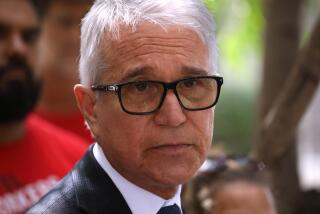L.A. campaigns hope Obama voters return
- Share via
Candidates in the March 3 primary election in Los Angeles have zeroed in on the thousands of newly registered voters who lined up at the polls in November’s presidential election, hoping to boost turnout in an off-year race that lacks a big-ticket political slugfest.
This year’s mayor’s race lacks the sizzle of the 2005 election, when Antonio Villaraigosa snatched the office from incumbent James K. Hahn in a crowded and hotly contested campaign. That leaves the wide-open races for city attorney and controller, as well as a $3-billion solar energy ballot measure, to tantalize the citywide electorate.
No one expects to see anything approaching the 80% record turnout of November, but the campaigns hope the post-election Barack Obama euphoria in this heavily Democratic city will motivate enough voters to come near the 24% turnout in the 2005 primary.
The campaign supporting Measure B, the city’s $3-billion solar energy proposal, is specifically targeting newly registered voters with telephone calls and campaign mailers, financed primarily by local labor organizations. Groups affiliated with the International Brotherhood of Electrical Workers union have poured $270,000 into the pro-Measure B campaign, and will be one of the solar program’s biggest beneficiaries because they represent the city workers who would install the units.
“Any other year, in a March election like this, we would be expecting a low turnout. Barack Obama’s election has brought in a broad new coalition into the Los Angeles electorate,” said Sarah Leonard, spokeswoman for Measure B. “It’s a new pot of voters that we believe are predisposed to support our measure.”
To help do so, the organization has enlisted Mitchell Schwartz, who ran Obama’s California campaign.
City elections officials are wary about predicting turnout for the March 3 election, but said there were some encouraging signs. The number of people receiving permanent vote-by-mail ballots has more than doubled since the 2005 election, increasing from 107,342 to 232,730 -- in large part because of the excitement of last year’s presidential campaign.
Monday was the first day voters who won’t automatically receive a vote-by-mail ballot could request one.
Only one of the eight City Council races appears to be competitive, the six-candidate political scrum to replace Councilman Jack Weiss. (Weiss is running for city attorney against former Deputy Dist. Atty. Carmen “Nuch” Trutanich and three other candidates.)
But Weiss’ district, which stretches from Century City to Sherman Oaks, has 167,000 registered voters, and a large turnout there would probably affect all citywide races.
Mayoral candidate Walter Moore, a business attorney from Carthay Circle, said he expected to see a low voter turnout March 3 “because we’re all burned out and nobody as exciting as Obama is running.”
Moore has raised an impressive $216,000 in his long-shot campaign, which, while far short of the $2.7 million raised by Villaraigosa, has been enough to earn him $43,000 in city matching funds so far. Moore believes a low turnout can only help him because, he said, his loyal supporters are more inclined to go to the polls.
“That’s a huge advantage,” said Moore, who recently led an unsuccessful petition drive to effectively force a police crackdown on illegal-immigrant gang members.
Ace Smith, veteran campaign manager for Villaraigosa and Weiss, said he expected turnout to be higher than many anticipate. Because of that, he said, it would be a mistake for candidates to focus their campaign message only on small pockets of voters, especially in a citywide contest.
“You cannot be so narrow to just think about the people who are turning out. You have to have a discussion with the entire city,” Smith said. “Everyone in the city . . . is affected.”
The city’s primary is just the first in an another unusually high number of off-year elections in 2009, including a March 24 race for the state Senate’s 26th District seat vacated by Mark Ridley-Thomas, who was elected to the Los Angeles County Board of Supervisors last fall.
If U.S. Rep. Hilda L. Solis (D-El Monte) is confirmed as Labor secretary, officials will have to schedule an election to replace her. State leaders have also signaled that they may set a special election to deal with the budget crisis. Plus, the city’s general election is May 19.
Still, November’s presidential election may have proved powerful enough to overcome any election fatigue.
“It’s not just that people voted in that election, it’s that people saw that their vote made a difference,” said Kim Alexander, president and founder of the California Voter Foundation, a nonpartisan voter-education group.
“They’re now in the crosshairs of registrars’ offices and are more likely to get campaign mailers and candidate information.”
Low turnout in off-year races also often leads to the argument that they should be combined with state and federal elections when voter participation is higher. But then officials worry that the local races will get short shrift, Alexander said.
Arleen Taylor, chief of the city clerk’s Election Division, said county elections officials have opposed adding Los Angeles to a consolidated county-city ballot, in part, because the ballot would be enormous and difficult for voters to digest.
Taylor said that city officials also were concerned the Los Angeles races and ballot measures would be buried too low in the ballot.
“Still, it comes up every two years,” Taylor said. “I’m sure it’ll come up again.”
--
jennifer.oldham@latimes.com
More to Read
Get the L.A. Times Politics newsletter
Deeply reported insights into legislation, politics and policy from Sacramento, Washington and beyond. In your inbox twice per week.
You may occasionally receive promotional content from the Los Angeles Times.










